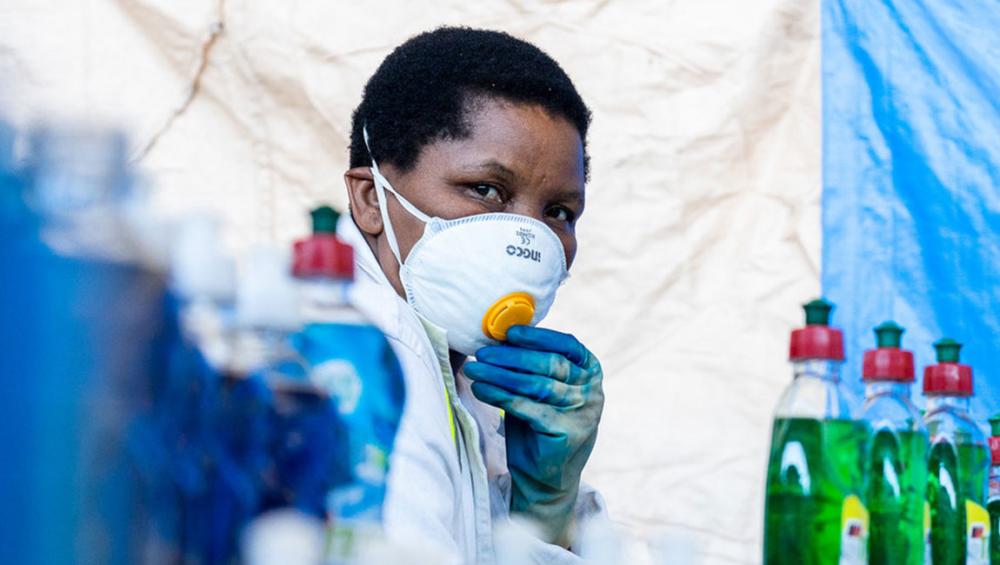Just Earth News | @justearthnews | 25 Jul 2020, 04:14 am Print

New York: The coronavirus pandemic should not be used as an excuse to clamp down on fundamental freedoms, the UN human rights office (OHCHR) reminded authorities in Zimbabwe on Friday.
OHCHR spokesperson Liz Throssell, speaking to journalists in Geneva, expressed concern over allegations suggesting that Zimbabwean authorities may be using the COVID-19 crisis as a pretext to stifle freedom of expression and peaceful assembly on the streets.
Targeting health workers
Amid a deteriorating economy, she said it was clear that COVID-19 has added greatly to the challenges Zimbabwe faces, and placed a further burden on an already struggling health sector.
She said the human rights office was concerned over reports of “police using force to disperse and arrest nurses and health workers”, for breaching lockdown restrictions while simply “trying to protest for better salaries and conditions of work”.
According to OHCHR, on Tuesday, Zimbabwean President Emmerson Mnangagwa, highlighted an increase of 600 COVID-19 cases in a week – to a total of 1,713 – and announced a series of measures that he said were necessary to curb the spread of the disease.
These include a dusk to dawn curfew and the curtailment and suspension of freedoms that, as he put it, Zimbabweans “have always enjoyed”.
“While recognizing the Government’s efforts to contain the pandemic”, the OHCHR spokesperson said “it is important to remind the authorities that any lockdown measures and restrictions should be necessary, proportionate and time-limited, and enforced humanely without resorting to unnecessary or excessive force”.
Pattern in intimidation
A pattern of intimidation became clear surrounding events in May when three female members of the main opposition party, were arbitrarily arrested and detained for taking part in a protest.
Joana Mamombe, Cecilia Chimbiri and Netsai Marova, alleged that after State security officials abducted them from a police station, they were tortured and sexually assaulted.
“The women were then formally arrested in June, charged with participating in the protests and faking their abduction”, said Ms. Throssell, adding that they had been recently released on bail.
Exercising ‘recognized human rights’
Peaceful protest are an exercise of recognized human rights -- OHCHR spokesperson
Among the latest incidents, investigative journalist Hopewell Chin’ono was arrested on 20 July, and charged with inciting public violence.
This came after he tweeted support for nationwide protests against Government corruption and worsening economic conditions, said OHCHR.
Jacob Ngarivhume, an opposition leader who has been calling for the protests on 31 July, was also detained and similarly charged.
“Merely calling for a peaceful protest or participating in a peaceful protest are an exercise of recognized human rights”, stressed Ms. Throssell.
Finding answers
The UN rights official maintained that OHCHR encourages the Government to “engage with civil society and other stakeholders to find sustainable solutions to grievances while ensuring that people’s rights and freedoms are protected in accordance with Zimbabwe’s human rights obligations”.
In conclusion, she said the State had an obligation to “guarantee economic, social and cultural rights” of Zimbabweans.
- Viral Irish food bank photo sparks shocking racist attacks on Indians
- Caught on camera: Two foreigners assaulted in Israel in an alleged racial attack
- Pakistan: Parents heartbroken after court sides with man accused of kidnapping minor Christian girl
- Pakistan: Trafficked 35 years ago, Bangladesh-born woman approaches court against FIA for offloading her from flight!
- Hindu tea worker found bound and bloodied in Bangladesh garden during general elections; investigation underway





-1763561110.jpg)
